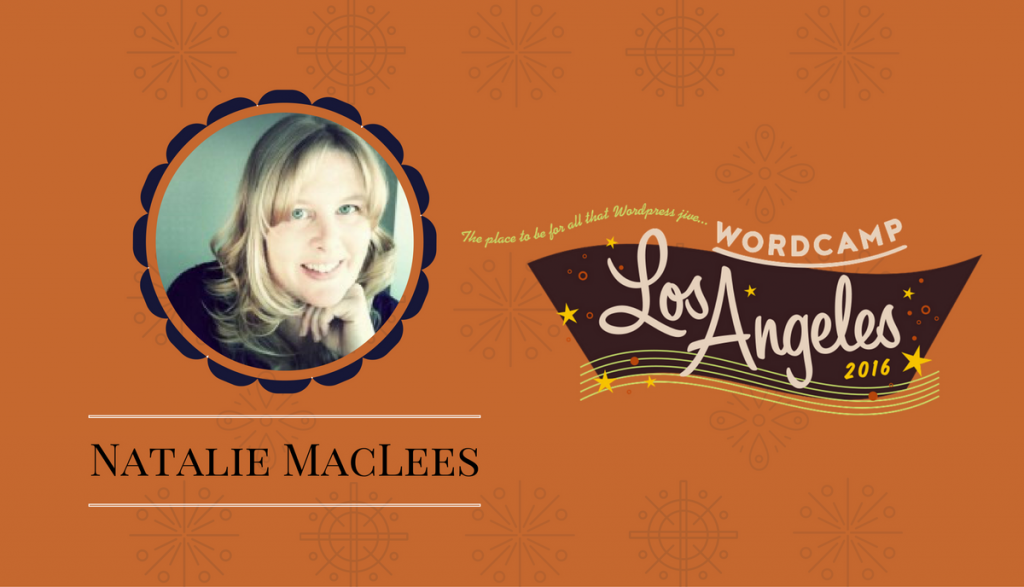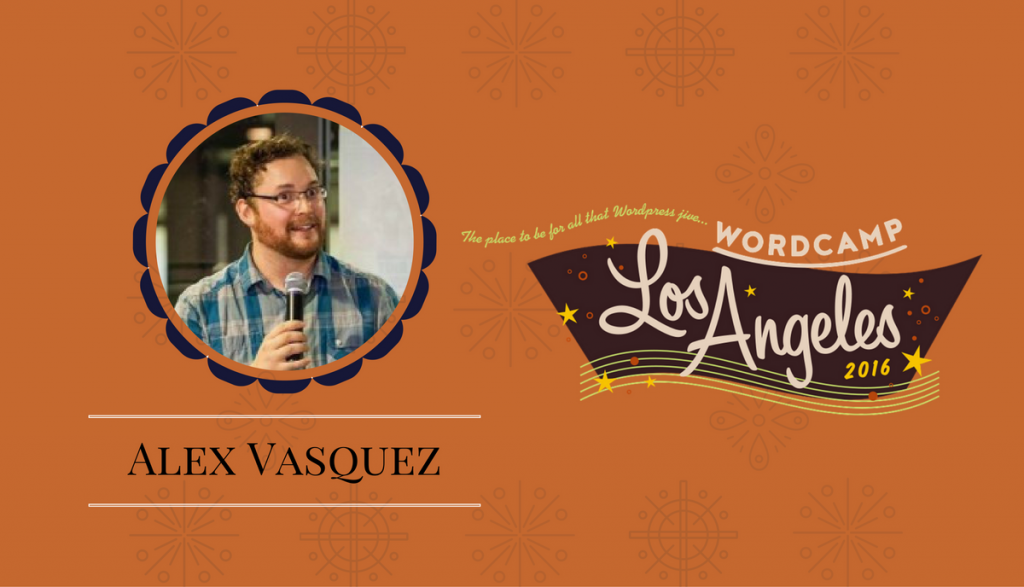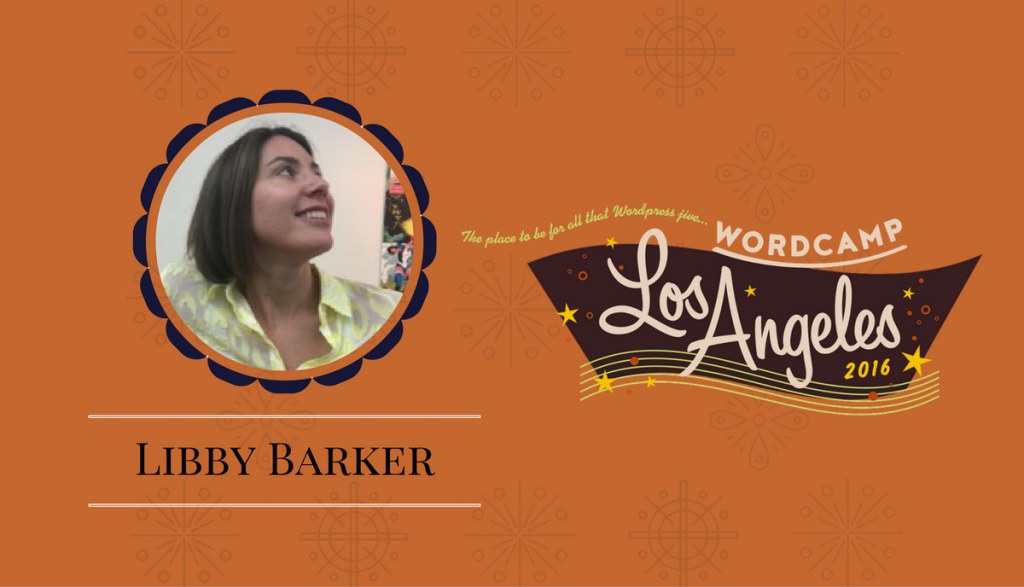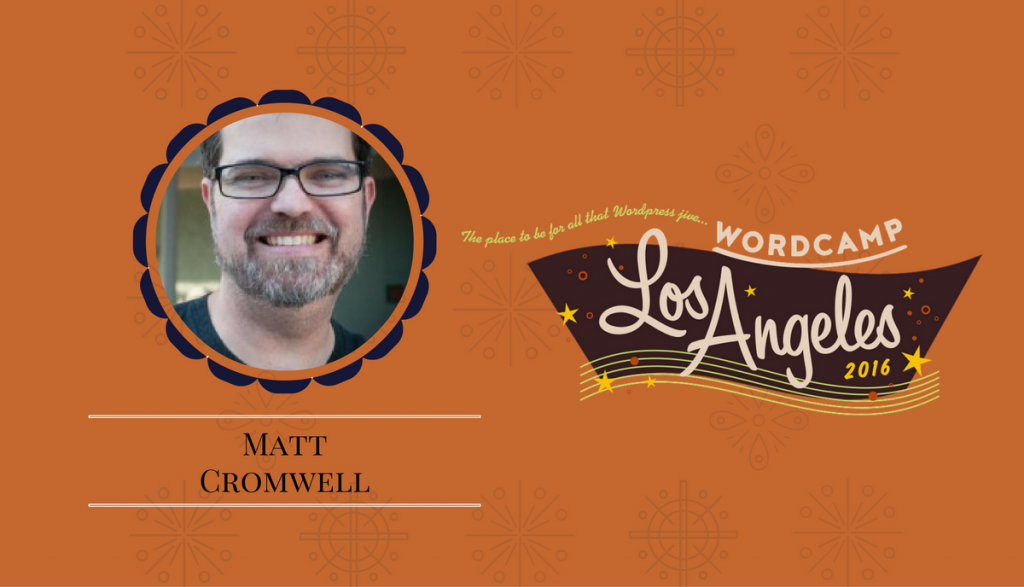- Carl Alexander: Use PHP arrays like a boss
- David Arceneaux: Leveling up in WordPress development, a workshop on command line tools
- Jacob Arriola: Getting Started With Flexbox
- Adam Bell: Anatomy of a Website: CulturePop
- Rachel Carden: Tools and Techniques for Evaluating Accessibility
- Matt Cromwell: Scaling Your WordPress Support for Growth
- Jerrett Farmer: WordPress by a Dummy
- Sallie Goetsch: Is WordPress the Best Tool for This Job?
- John J Giaconia & Kara Hansen: Scoping and Estimating WordPress Projects as an Agency
- WordPress Support Toolkit
- Christina Hills: How to Pick a WordPress Theme for Beginners
- Cody Landefeld:Build a WooCommerce store that can rival Amazon
- Natalie MacLees: Bulletproof JavaScript for Themes and Plugins
- Kari Leigh Marucchi:Still Photography & WordCamp Culture: Participating, Recording, Contributing
- Andrew Norcross: Plugin Architecture Basics
- Nathan Tyler: Getting Started with the WP REST API
- Mark Uraine: Design for Telepathy
- Alex Vasquez: Automating Against the Machine
- Sarah Wefald: “Yes, and…”: Using improv comedy for project management success
Author Archives: Thomas Patrick Levy
Natalie MacLees Needs More Podcasts
In today’s speaker interview we’re talking with Natalie MacLees, a front-end web developer and UI designer.

Natalie is the founder and principal of the interactive agency, Purple Pen Productions. She is the author of jQuery for Designers, now in its second edition. She was the lead organizer for WordCamp Los Angeles 2014 and 2013 and organized the first Website Weekend LA, a 48-hour hackathon matching web professionals with nonprofits in need to websites. She’s also the founder and chapter leader of the Los Angeles chapter of Girl Develop It, bringing affordable and accessible coding classes to the community. Along with Nathan Tyler, she created the Draw Attention WordPress plugin for creating interactive images. She makes her online home at nataliemac.com.
What should we know about you that you haven’t included in your brief, third-person, professional biography?
I’m a podcast addict. I subscribe to about 35 different podcasts and I keep up to date on all of them. Right now I’m waiting for some episodes to be released today so I have something to listen to.
The second Website in a Weekend is around the corner, can you tell us a little bit about the event and how we can get involved and participate?
I organized the first Website Weekend in 2013. I do a lot of work with nonprofit organizations so I know there’s a huge need for help with websites. And it’s difficult help to get – web professionals are busy folks whose skills are already in high-demand, so it’s tough to make time for a pro bono project. So I thought if we could limit the commitment to a weekend, we could get a lot of professionals on board to help out and that worked! Everybody came out and worked hard and had a good time and got some really good work done for some really worthy organizations.
Website Weekend 2016 is happening October 22 and 23. We’re looking for all kinds of help, so don’t feel like you’ve got to be an expert coder to make a meaningful contribution. Anyone interested in participating can get more information and get signed up at our website, http://websiteweekend.la. Applications are open for nonprofit organizations too, so if you run, know, or love a nonprofit that could use some professional help with their web presence, send them our way!
As a former organizer of WCLAX, how does it feel to be returning as a speaker rather than an organizer?
I’m so excited to be able to attend and just enjoy the talks and chat with friends I haven’t seen in awhile instead of having to be stressed out about whether or not lunch will be served on time or if the registration desk is running out of lanyards. 🙂
As a founder and leader of so many communities, what can you suggest to people who want to get more involved in their local communities but don’t know how?
Don’t wait for anyone to give you permission to do it, just go do it! Everybody’s waiting for that awesome new group or conference or event you want to start, so take the first steps.
What’s one thing that plugin and theme developers can start doing today to write better Javascript?
Stop making dangerous assumptions. Don’t assume that an element will always be on the page, don’t assume that all WordPress installs are in the root of their domain, don’t assume that people won’t use custom post types. WordPress is flexible and can be used in so many ways, so be sure to account for that when you’re writing your code.
Natalie will be presenting Bulletproof JavaScript for Themes and Plugins at WordCamp Los Angeles 2016 in the Dunbar at 9:00am on Sunday, September 11.
Alex Vasquez is Automating All the Things
Alex “Nice Hair” Vasquez got his start in WordPress by working the docks for Jimmy “the pincer” Spiccoli. What started as a fish-punching summer job turned into a multi-thousand dollar business. Alex is survived by his future daughter, Alex Jr. an apple and two half-eaten gobstoppers.

What should we know about you that you haven’t included in your brief, third-person, professional biography?
I’m Alex Vasquez, a WordPress Developer and owner of DigiSavvy, a boutique digital studio providing digital marketing and custom web development services.
What is “the Machine” and why should we want to automate against it?
“The Machine” is a metaphor for handling day to day business operations. If you’re running your own business or small agency then you know what it means to wear multiple hats. If you can automate things then automate them! I’ve worked hard to develop automated processes that help move my sales funnel along from general inquiry thru to project onboarding and finally off-boarding.
You’re preparing for a long journey and you know you’ll need to do plenty of automation on the way but you’re only allowed to bring one tool, which do you choose and why?
The magic that has helped me go the most is tough. ActiveCampaign and Co-Schedule have been huge additions to my business. But if you jerky people are only letting me choose one, then it has to be ActiveCampaign.
Why should we trust you, a former fish-puncher, to provide us with good strategies?
Can you really trust a fish puncher? No. I always took driving advice from people who have been in the most accidents. I prefer not to be a member of any club who would have me as a member. Take from that what you will, child of the corn! =)
What one thing can we start automating today that we might not have considered?
I think automating your sales funnel or lead intake is a great place to start with automation. It requires thought, but if you lay down a good process for yourself, you can save a lot of time and mental bandwidth by letting people qualify themselves for your service offerings and follow up with them. You can ping old clients you worked with and get more work out of them. Just by “fooling around” I added just over 2k in additional revenue by sending an automated campaign to old clients who I wasn’t work with, but still had websites I worked on for them. It’s not rocket science. It takes time and thought.
Head over to Club Alabam at 1:30pm on Sunday, September 11 at WordCamp Los Angeles 2016 to catch Alex’s presentation, Automating Against the Machine, and stick around for theAfternoon Business Panel (Moderated by Steve Zehngut) with Alex, Libby Barker, and Matt Cromwell in the same room at 3:30pm.
Speaker Interview with Kim Shivler
Kimberly (Kim) Shivler, M.Ed. has been a technical trainer and writer for over 20 years.

She learned HTML in 1995 building help files as a UNIX system administrator and opened her first web development company in 1996. Since then, Kim has worked as a business owner and employee in a variety of fields including a few years as part of an IBM worldwide team. Between 2008 and 2012, she worked with a variety of Content Management Systems and ran an online membership site for skincare professionals using Drupal. In 2012, Kim found WordPress and never looked back at any other CMS. She has been creating online courses in WordPress since 2013 and currently combines her background in education, years of business experience, and WordPress experience to teach others how to build online courses and membership websites.
What should we know about you that you haven’t included in your brief, third-person, professional biography?
I absolutely adore cats, and my three are frequently part of my webinars and classes. I’m in the process of creating a website just for them. I’m basically a goofball who loves to have fun, so if you take my classes prepare for a little silliness and some fun along with the tech and business information.
We’re all partial to WordPress, but as someone with a host of experience on other platforms, why WordPress over the alternatives?
There are so many reasons to love WordPress. The community rocks!! I think that’s one of my favorite things about it.
Also, since my main focus in life is teaching and empowering others, WordPress is a no-brainer. It is the most powerful online platform that I have found that can still be accessible to people who don’t want to become professional developers.
Having said that, there are definitely technical aspects of WordPress that need to be learned if you’re going to work with it, but in the past I never would have been able to teach my mother to build a basic website and blog to share her message.
In 20+ years on the web, what’s the most drastic change you’ve seen? What have you done to stay relevant despite this change?
From when I started in 1995, I’m not sure if the most drastic change was the advent of WYSIWYG editors like FrontPage and Dreamweaver, the implementation of dynamic sites that then lead to the Content Management Systems like WordPress, or the addition of CSS which really changed the way we could work with styling sites.
As for staying relevant, in some ways I got lazy. I still use text editors for CSS, but now fall back on the visual editors for content editing. And, I’ve moved to more user friendly text editors like Text Wrangler on the Mac for hand editing. I’ve completely forgotten vi.
In your experience, what about learning management systems is so powerful and why are they so hot right now?
The power of learning management systems is the increased connection and interaction they provide between student and teacher. While a blog post, may provide great information, a well created learning system and user-focused, educationally sound course can create a bond between student and teacher. Even when much of the interaction is automated, because you are able to step-by-step walk someone through a process and setup homework, quizzes and other interactions to help insure that they understand and demonstrate the knowledge of what you’re teaching there is a deeper connection than a simple post or ebook.
As for why they are hot right now, the first is because of the interaction aspect. People are looking for interaction and engagement. They don’t just want authorities broadcasting to them. They want to engage. Unfortunately, the second reason they are hot is that the more spammy Internet marketers are touting them as a way to get rich quick. In my experience, they can be powerful tools to build and engage with an audience, and while some people have had 6 figure launches, it’s not the norm.
What one piece of actionable advice would you give to someone who wants to start building their learning management system today?
Create your plan and requirements document. This is the most critical step to insure you build the platform that fits your needs. We’ll be covering some of this in the presentation and a planning guide will be available for all attendees. It’s important to know what you need before you build it. For example, do you need the option for multiple instructors? Are you going to want forums for increased engagement and interaction? Building a platform and then finding it doesn’t meet your needs is a bummer.
Head over to The Dunbar at WordCamp Los Angeles 2016 on Sunday September 11 at 2:3opm to catch Kim’s talk Building an Ultimate Learning Platform with WordPress.
Speaker Interview with Jarrett Gucci
Jarrett Gucci comes from a retail background that started at Home Depot in Buffalo NY as cashier and 18 months later was asked to be a project manager based out of Carson California with a goal of opening 12 stores in 14 months.

This goal was accomplished. He has also been an area manager at Big Lots and Bed Bath and beyond. He left his very last retail career as a district manager at Linens & Things in 2007 to pursue a hobby of website development as hope he could make some money doing it. After 4 years of building and managing WordPress sites, he founded a company called WP Fix It and since 2011 his company has serviced over 48,000 WordPress support tickets. Something you may not know about Jarrett besides all this, is that when he was 15 his neighbor gave him a 1962 dodge dart and he completely took it apart and rebuilt it.
What else should we know about you that you haven’t included in your brief, third-person, professional biography?
I love to go camping with the family, all seven of us. I have 5 daughters ranging in age from 4 year twins to 16 old boy crazy teenager.
What did you learn at Home Depot, Big Lots, etc… that you were able to carry across industry lines to WordPress and the web?
The greatest strength I brought with me from that industry was customer communication skills. I have found that this has really set me apart from others in WordPress development and support because while many of them are genus behind the keyboard, communicated with customers can some times fall short. I have used training from past experience to train my team and always focus on a high level customer service.
Tell us a bit about WP Fix It, where’d the idea come from and how did people around you react to the drastic career change?
This idea was modeled after the Apple Support program and created one Sunday afternoon in 2011 while my wife was asleep on the couch. After about a year in, it was very apparent that the idea was better than expected and their was a desire for instant 1 time payment support rather than the very common monthly model. Those that knew me for years as a developer were happy for my transition and excited to see a new support option for WordPress users.
What’s a common mistake we might not know we’re making, but can easily avoid, when handling support tickets?
Has been and I think will always be, the issue of submitting the correct login credentials. This has been the number one thing that delays a support ticket being resolved.
What can we start doing today to provide better support?
Education and willingness to learn more each day. The web and WordPress changes fast and we must keep our minds moving with these changes to allow us to provide better support when needed.
Catch Jarret in the Blue Whale at WordCamp Los Angeles 2016 on Saturday, September 10 at 2:30pm presenting WordPress Support Toolkit.
Speaker Interview with Rachel Carden
Rachel Carden is a Senior Software Engineer for The Walt Disney Company with over ten years experience in back and front-end web development and digital design.

Before Disney, she founded WPCampus: Where WordPress Meets Higher Education and spent over nine years working in higher education. Rachel enjoys building an accessible, open web using numerous, and ever changing, languages, frameworks, and APIs.
What should we know about you that you haven’t included in your brief, third-person, professional biography?
Earlier this year, I moved across the country from Alabama to California to work for The Walt Disney Company. Exploring Los Angeles and California has been a blast. There’s so much to see and do! I’m so grateful that I had friends in California who have been making sure I never want for a new adventure. And you know how we met? WordPress, of course. 🙂
Which Disney movie is objectively the greatest and why?
Objectively, The Lion King. You just can’t beat that combination of storytelling and music. Unobjectively, I could watch the animated Robin Hood every day for the rest of my life.
What initially sparked your interest in web accessibility?
My passion for web accessibility sparked when I worked in higher education. Higher education institutions, at least those who receive federal funding, are required by law (Section 508) to meet a certain standard of technology accessibility. When you work in higher ed, accessibility is required by law to be a part of your daily workflow.
And while the legal nature of accessibility plays a big role, the human element should be what drives us as web professionals to ensure our information is accessible. Data shows 1 in 5 people have a disability. If your site is inaccessible, you could be excluding 20% of your potential users, customers, students, etc. You could be restricting your information from 20% of the world. That’s a huge number.
If you place importance on web accessibility, you’re saying that you want your information, products, and services to be available to everyone. And not just those who can see, or who can hear, or can control a keyboard and mouse.
People matter. And once you realize the impact good accessibility can have on making your information available to everyone, you can’t help but become passionate about its growth.
Could you tell us a little about WPCampus, it’s origin, and how the first conference went?
WPCampus is a community and conference for web professionals, educators and people dedicated to the confluence of WordPress in higher education. Its mission is to advance higher education by providing a support structure and wealth of knowledge for anyone who uses, or is interested in using, WordPress in the world of higher education.
WPCampus was founded in August 2015. The idea came to me from a tweet but it was no surprise that it caught on and grew so quickly. Before WPCampus, there was no organized collaboration or discussion for those using WordPress in the world of education. We knew we were on to something special.
The WPCampus community, and its events, are open to faculty, staff, students, and even those outside full time education. We have lots of individuals from the WordPress community at large who want to be involved and help out in whatever way possible. What’s more, our member base includes folks from all over the world. It’s been amazing to see how passionate our members are about what we’re doing and what we can achieve.
We organized our first conference this year, which took place July 15-16, 2016 at The University of South Florida Sarasota-Manatee in Sarasota, Florida. The event was amazing and we consider it a huge success. We had over 150 attendees, from 60+ educational institutions in the U.S. and Canada, join us for a knowledge-filled two-day event. Videos from most of our 38 sessions can be found on the event website at https://2016.wpcampus.org/.
If you work at a university, and would like to bring the awesome of WordPress in higher ed to your campus, WPCampus is accepting applications to host our conference for 2017. The application will close Friday, October 28, 2016. You can learn more at https://wpcampus.org/apply-to-host/.
If you would like to get involved with the WPCampus community, you can do so at https://wpcampus.org/get-involved/.
What’s an easy step WordPresser’s can take today to start making their sites more accessible?
The best way to get started with accessibility is to evaluate your website. There are a multitude of tools that will scan your website and, what’s more, will explain how to address any issues that are found. This is an easy, first step that will give you a good overview of how to take care of existing issues and will educate you on how to build sites going forward.
If you download my recent WordPress plugin, Wa11y, you will have access to two of my recommended tools: tota11y and WAVE. I also recommend HTML_CodeSniffer, which comes with a handy dandy bookmarklet for quick in browser testing. Most of these tools can be used without loading software to a website. This can really come in handy if you’re considering purchasing a WordPress theme or plugin and would like to evaluate their demos beforehand.
If you’d like to learn more about accessibility, and the available tools and resources, join me at WordCamp LA on Sunday at 1:30. We can work together to make the Internet more accessible, one website at a time.
Head over to the Dunbar at 1:30pm on Sunday September 11 at WordCamp Los Angeles 2016 to catch Rachel’s presentation, Tools and Techniques for Evaluating Accessibility.
Libby Barker SCRUMs to Survive a Desert Island
Today we chat with WCLAX speaker Libby Barker, a Project Manager at Human Made, a global WordPress agency based in the UK.

Facilitating creative teams has always been a passion for Libby. After receiving her BFA in Film & TV, she worked for several years in media and communications for organizations such as as The Food Network, The Daily Show with Jon Stewart, Whitewall Magazine, and the Office of Nelson Rockefeller, Jr. In 2014, she took a job as a PM at WordPress agency Union Street Media and never looked back. In 2015, she received her Certification as a Scrum Product Owner. As a PM at Human Made, Libby works with a remote team to deliver outstanding sites for clients around the globe and actively seeks to implement Scrum and Agile methodologies tailor made to their workflow. When not working, she enjoys running, writing, and hiking with her husband in Vermont’s Green Mountains.
What should we know about you that you haven’t included in your brief, third-person, professional biography?
I’m a sucker for puns. The worse, the better. It’s almost compulsive. Maybe I’ll have an opportunity elicit some cringes while I’m visiting LA.
You’re stuck on a desert island with a small group of friendlies and your vast knowledge of all things SCRUM. What do you do first to ensure you your group survives?
Uh oh! First, we’d need to have a Backlog Refinement meeting. On a desert island, this would mean assessing our individual strengths, compiling a list of all tasks we need to accomplish in order to survive, and prioritizing the tasks. Launch critical issues (shelter, finding water and food sources, finding fuel for fire) would be right at the top of the list followed by ongoing tasks. The team would self-select tasks based on their strengths, and I would work with the team to identify obstacles (I imagine there would be a few!) to accomplishing their tasks. After this first meeting, we’d move forward daily stand-ups, of course, and weekly retrospectives to iterate on our survival strategy.
What’s one common mistake or pitfall you’ve seen teams new to SCRUM make and how can those teams avoid that mistake moving forward?
A common pitfall is that teams new to SCRUM (or other Agile methodologies) tend to get sidetracked with the aesthetics of Agile. By the aesthetics of Agile, I mean debating which Agile methodology to use, which Agile software to use, how to apply SCRUM roles to team members, how long sprints should be, etc. At the end of the day, this is not what makes a team Agile. Agile is a philosophy about empowering teams, not imposing alternate frameworks. If your team wants to become Agile, take some time to absorb the Agile Manifesto and Agile principles. For managers, be prepared to step back and think of your role as one of facilitator and let your team direct the transition. Use the Manifesto as your compass and everything else will begin to take shape.
If I were to do one day hike in Vermont, where would it be and why?
I would love to hike Camel’s Hump! This is one of the most distinctive peaks in Vermont (it really looks like a camel’s hump!) and one of the highest.
Many teams have heard of SCRUM and see the benefits but maybe know where or how to get started. How’d you get started with SCRUM and what can we learn from your beginnings?
I was introduced to SCRUM by a colleague in my first role as a Project Manager. At the time, the team was suffering from major pain-points with communications as a result of a silo’d production process, which can be common in Waterfall workflows. I began researching ways to bring transparency to production using Agile techniques and made some progress based on my self-education, but participating in the SCRUM Product Owner Certification was a major breakthrough because I was able to get practical experience that I could bring back to the team.
There are so many resources available, it can be overwhelming to determine which is most appropriate for your team. The Agile Alliance and the SCRUM Alliance are the go-to organizations for the Agile community, but nothing compares with hands on experience. Meetups or User Groups are a great place to start but certification programs are helpful if you want to really understand the fundamentals. If you are willing to make a serious investment in the transition, hiring a coach to work with your team is also an option.
Head over to Club Alabam at 2:50pm on Sunday, September 11 at WordCamp Los Angeles 2016 to catch Libby’s puns and Agile Power: Agile Methodology for WordPress Development presentation and stick around for the Afternoon Business Panel (Moderated by Steve Zehngut) with Libby, Matt Cromwell, and Alex Vasquez in the same room at 3:30pm.
Please Don’t Throw Peas at Speaker Matt Cromwell
In today’s speaker interview, meet Matt Cromwell, head of Support and Community Outreach at WordImpress.com.

Matt is the author of many free WordPress plugins, a popular blogger at his website (mattcromwell.com), an admin of the Advanced WordPress Facebook group, co-organizer of the San Diego WordPress Meetup, and a WordCamp speaker and frequent attender.
What should we know about you that you haven’t included in your brief, third-person, professional biography?
People really should know that I’m deathly allergic to green peas — like go to hospital kind of allergic. So throwing tomatos during the presentation is fine — I get that, but throwing green peas is like throwing knives at me. Resist the urge to throw peas… PLEASE!!
As an organizer, speaker, and attendee or WordCamps, you’ve certainly seen a little bit of everything WordCamp. What’s your favorite thing about these events?
My favorite part of WordCamps is the certainty that you’ll make new fast friends. WordCamps are big family reunions, while still totally accessible for the uninitiated. Folks really want to connect with those they already know well, but are simultaneously really receptive to new faces.
But this brings up another thing people really should know. It’s some sort of running joke to say I’m a WordCamp organizer. I’m NOT. I’ve never organized a WordCamp. Bless your hearts all you WordCamp organizers. You’re amazing folks, but that’s one part of WP Community I don’t have plans to join.
What are the key symptoms a support team should look for that would suggest the team is struggling to scale?
Churn. If you’re losing your front-end support folks regularly then they’re probably overworked and unhappy and not feeling like they have a future in your company. Secondly, unhappy customers. Thirdly, sagging sales. When Support suffers everything else follows suit. Support is the glue of your organization and if the glue cracks, things start to fall apart quickly
Tell us a little more about WordImpress! What are you all about and how’d you get involved?
Devin Walker is the founder of WordImpress. He started it in order to have an umbrella to put his premium plugins under as a side-job to his thriving freelance work. At one point he wanted to level up WordImpress, so he reached out to me to join as a partner. Together, with our Business partner Jason Knill, we’ve seen we’ve seen the existing WordImpress plugins grow leaps and bounds, and we rolled out our pride and joy: The Give Donation plugin. It’s seriously an absolute pleasure to work on that plugin, to support these customers and to see a real international community growing up around the project. We love it.
What’s one small thing support teams can start doing today to provide better support?
Small support teams (like my own) have to start collecting data on their support. You can’t understand the effectiveness of your support team without data, and you can’t know the importance of when to hire new folks without data. So if you are providing support on a system that doesn’t make tracking your support data easy — find a new system, today.
Matt will be presenting on Scaling Your WordPress Support for Growth at WordCamp Los Angeles on Sunday, September 11 at 2:10pm in Club Alabam and stick around for the Afternoon Business Panel (Moderated by Steve Zehngut) with Matt, Libby Barker, and Alex Vasquez in the same room at 3:30pm.
Speaker Interview: Cody Landefeld
Today we’re talking with Cody Landefeld, Senior web strategist and founder at modeeffect. Modeeffect helps technology companies & non-profits build powerful web solutions on WordPress.

What should we know about you that you haven’t included in your brief, third-person, professional biography?
I am a husband and father of 3. I enjoy music, sports, and comics. I started dabbling in WordPress around 2007 because all other CMS options at the time were awful. Was a fan of WordPress and was pleasantly surprised to find it was and is suitable for most small business websites.
You’re on a desert island and your only hope of survival is launching a WooCommerce store, what’s your goto secret tactic?
Setup Stripe first thing so we can get the money we need to pay the rescue boat to come and get us!
Tell us a little more about Modeeffect.
codyL is a WordPress consultancy I started around 2005. In 2013 we re-branded to become Mode Effect. The name choice was nice so I didn’t appear to be such an ego maniac 😉
I moonlighted up until 2010 when I was able to fulfill the dream of focusing on our company full time. It’s been quite a journey. One of the things I am most excited about is leading and nurturing a team who can help our clients grow their business and reach their goals.
With so many e-commerce solutions — even within WordPress — why choose WooCommerce?
We’ve used other e-commerce systems such as Magento and even other solutions built on WordPress. We started using WooCommerce in 2013 due to it being the most useful and well built e-commerce system we had used for WordPress.
What have you learned about working with non-profits that you wouldn’t have known otherwise or was surprising to you?
How much they value their web presence. Non profits are fantastic organizations and certainly have their shares of challenges but they definitely are organized when it comes to funding a resource that’s important to their core funding and existence.
Cody’s talk at WordCamp Los Angeles, Build a WooCommerce store that can rival Amazon, will be in The Dunbar on Sunday, September 11, 2016 at 3:30pm.
Sarah Wefald Solves Problems and Likes to Knit
Start your week with Sarah Wefald in today’s speaker interview.

Sarah Wefald came to Zeek the long way. She started out as a project manager at a major record label – the sort of job she had wanted since she had first thought it would be cool to work with musicians, a decision made back when she was president of her high school drama club. However, that dream was soon met with reality in the music industry: half the company worldwide was laid off after the label was purchased and privatized. Determined that her career would not be over at 23, she went back to school while working temp jobs to learn web development and design.
After finishing the program, Sarah started transitioning from her marketing career to more technical work within the music industry, handling social media and webmaster duties for bands. Finding Steve Zehngut’s WordPress meetup group in Orange County allowed her to take her knowledge of PHP and apply it to WordPress web development. As a result, she has created and launched dozens of websites for brands and small businesses on her own, and runs the OC WordPress Web Designer’s meetup at Zeek’s offices on the first Monday of each month. She has presented at WordCamp Los Angeles (2013 and 2014) and WordCamp Orange County (2014), and served on the organizing committee for WordCamp Orange County in 2015 and 2016. She’s very happy that Zeek has allowed her to unite her original love of project management with her enthusiasm for WordPress.
What should we know about you that you haven’t included in your brief, third-person, professional biography?
That pretty much covers it, I think. I like my job and music and the usual stuff like hanging out with friends, and also fun. I guess you could include that I like to knit and crochet? Not terribly rock and roll, but it’s relaxing.
What is the most significant way your career in the music industry (which we are all totes jelly of, btw) prepared you for what you’re doing today?
It taught me how to explain technical things to non-technical people – a typical musician may have trouble figuring out Twitter, let alone WordPress. Breaking it all down into steps that actually have bearing in their daily life of keeping their fans engaged and informed was vital. I also learned how to deal with a lot of big personalities, both in business and in creative.
What was your favorite production from your high school drama club days?
Probably Jane Eyre. It was my first lead role, so of course I loved it, but it was a tough one. Jane had me onstage for 95% of the two-hour showtime, so for the 8 or so weeks of the production, I didn’t do anything but rehearse after school while everyone else who wasn’t in the scene we were running got to socialize. The more informal shows with our improv troupe were more loose and fun.
We’ve all had impossible clients, and stereotypes say musicians/bands are the worst. How do you approach difficult requests from your clients, like non-specific feature requests, plugins that don’t exist, features that are unnecessarily complex, and so on?
Believe it or not, musicians are among the easiest, because they just want you to handle it. They would rather focus on their craft, so you just have to get their (or, more likely, their manager’s) sign-off on the site structure and look and feel matching their album artwork, then go build however you need. The only problem is when you get someone that changes their mind a lot, but even then, it’s not that bad. They get it when you say “I can’t do this within the budget we have, so let’s save this feature for right now and come back to it.”
When we get non-specific or otherwise confusing requests from clients now, I try to back them away from the technological request and into the problem they’re trying to solve. I once spoke to someone who asked me for what would have been a massive multiple-week-long database restructuring, but when we talked about the problem they needed solved instead, it turns out all they needed was to have one default search radius adjusted. The job was done in less than an hour.
What’s the most rewarding part about running the OC WordPress meetup?
Giving back is the most rewarding part. I had some formal design and development training, but for the most part, I’m self-taught. I started going to Steve Zehngut’s general WordPress meetup 5 years ago to learn how to apply what I knew about PHP to this CMS I’d heard so much about. Not long after, I started going to OCWP dev night as well, even though I didn’t understand anything I heard. I just kept coming back and taking notes, and eventually I started making sites: first a stock theme, then a child theme, then a completely custom theme. I asked a lot of questions and got a lot of amazing answers. People were incredibly generous with their time and knowledge, and I tried to keep myself worthy of it by continually getting better at what I was doing, and then doing more of it. Being a meetup host myself is the perfect way to help ensure other people are able to learn the way I was.
Catch Sarah’s presentation, “Yes, and…”: Using improv comedy for project management success, at WordCamp Los Angeles 2016 in Club Alabam at 10:20 AM on Sunday, September 11, 2016 and again at 11:00 AM during the Morning Business Panel (Moderated by Steve Zehngut).